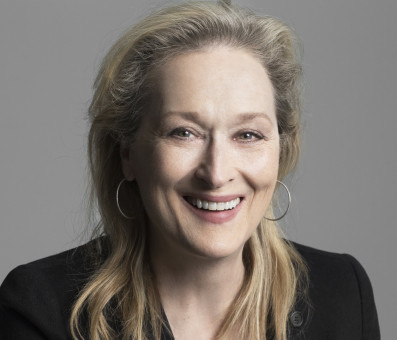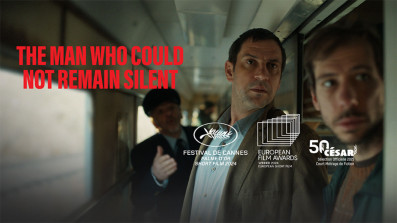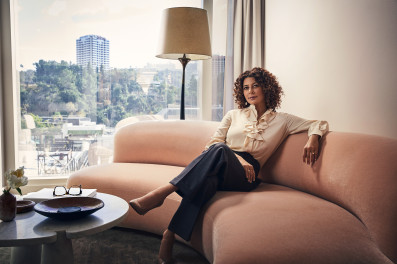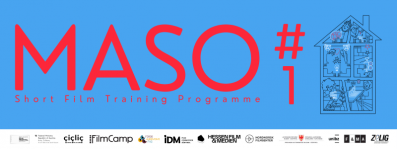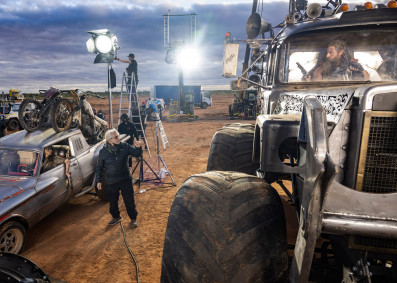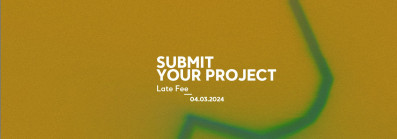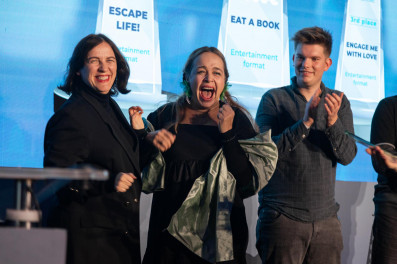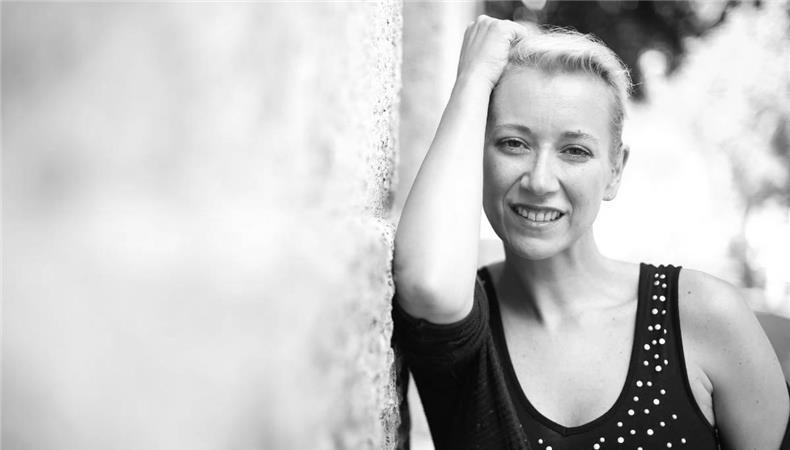
Interview with actress Lana Barić: There is a lot of silence, propulsion and that is not good
I don’t know if I’ve broken down stereotypes, they’re very firmly entrenched in tradition and won’t break down so easily, but I hope I’ve questioned them.
Lana Barić (Split, 1979) is a film, television and theatre actress. She is a drama champion at the Croatian National Theater in Zagreb. She had notable roles in the films Shut Up, You Carry Me, Trampoline, the lead role in the film Eden and in the film Teresa37 for which she also wrote the screenplay. In this interview, Lana Barić talks about her profession, activism, women's stories in cinema and human rights.
Before we start talking about Teresa, I would like to dwell on Lana… Your fighting spirit and the need to show solidarity with those who do not belong are fascinating. What determined you the most, how much does it have to do with the environments in which you lived? What made you empathetic, and what makes you raise your voice against injustice?
Somehow I can't do otherwise. I am touched by injustice, it shakes me, so it comes from that, I would say. It certainly has to do with the environment in which I grew up and Dalmatia has largely determined me, mostly because of the position of a woman, which is what the film I wrote is about. It often consumes me altogether and there is often no feedback or result, but I also accepted it and realized that the fight is important and that I do not necessarily see the results of that fight and if they exist or if they will exist, because I feel it makes sense and that it should be so. I don't think it can be otherwise. I am intense by nature, so this is the whole package, although I receive blows just as intensely, so I need time to recover. I have to be careful not to burn out, and that’s not hard at all especially in these times. I think we’re all a little on the verge of a nervous breakdown.
In the film Tereza37, whose screenplay you wrote about 15 years ago, you reflected on your own experience of growing up in Dalmatia, and the experiences of your mother, grandmother and women around you. Teresa is a young woman, broken by the pressure of adversity, has a cold relationship with her father and husband, is insecure and tries to make some breakthrough in her life, first to realize herself as a mother, and when that fails, then tries to do any other change. Do you think that you have broken the stereotype of a Dalmatian family, cheerful, warm, talkative? Have you broken the stereotype of a woman who is rugged, loud, cocky and on whom the home rests?
I don’t know if I’ve broken down stereotypes, they’re very firmly entrenched in tradition and won’t break down so easily, but I hope I’ve questioned them. I think I am cocky and loud just because it was one of the ways to survive as a woman in Dalmatia. This sounds very dramatic, but it's just like that, you adopt some of these principles to make it easier to function even though I'm a lot closer to an introvert than an extrovert, for example. My impression of Dalmatian families has never been that they are cheerful, warm and talkative, although I believe there are many of them, I have always felt those darkness, secrets, lack of communication, real communication, form, patterns of behaviour that are learned and repeated, it is what’s in the base, so that’s how I wrote it for the film.
The film Tereza37 was the absolute winner at the Pula Festival. Last year, that happened with the Diary of Diana Budisavljević. Is our cinematography becoming interested in women's stories and is more space being given to directors, screenwriters, women in leading roles…?
Again, it will take time and time, because the statistics are truly devastating and largely on the side of the author, not the author. I am happy to make films with women in focus and more importantly - with women as protagonists. And that they were filmed by women, although both Teresa and Mater were directed by men. Namely, often the female faces in the film are closely correlated with the male and mostly there to support the male protagonists, so I am glad that this is not the case with either Mare, Teresa or Mater. Many times a female character in movies and series and exists only to a man which means that her story is secondary. And there are so many hidden and important stories. I am very happy to have the opportunity to watch them.
In big cinemas, we see heroines who have won epic victories, placing a burden on all other women who have not had the opportunity, or the opportunity. How important is it to talk about invisible struggles, which we are forced to do every day, to defend our positions in society and why everything related to women is invisible - invisible struggle, invisible (household) chores…?
It is very important. Essentially, I would say, because we take for granted things that should not be taken for granted and the position of a woman is so distorted that it is painful. It is also painful that we have to continuously name things, point the finger and defend our position, but we simply have to until things change. Very many times I have been in a situation where I am not respected because I am a woman, many times I have witnessed aggression. After all, I am a woman who has her own opinion and openly expresses it, many times I have been insulted and belittled and it happens to me today. Nothing intimidated me, it only strengthened my perseverance to talk about all those visible and invisible struggles that each of us goes through.
Does it seem to you that when a woman wins, then they are all winners, no and are men’s victories reserved just for them?
I don’t know, I wouldn’t generalize. I’m more worried that women are less likely to win, but we’ll change that, I hope.
How important is it to you that your heroine jumps out of the canon of difficult social drama and the position of a victim? If you hadn't taken Teresa out of that discourse, it would have been another film that celebrates patriarchy, which is a handful in our productions and only contributes to the current situation.
I can’t speak for the world, but taking responsibility in these areas is something we still rarely see. I wanted to show things the way I witnessed them through my growing up and bring to the fore one woman and her struggle, in a very rigid, hard environment like Dalmatia. I have always been fascinated by how we have beautiful cities by the sea, islands, beautiful Mediterranean climate, lots of sun all year round, and so much darkness, so many secrets, so much disrespect, so much pain. Somehow, according to external factors, it seems to you that life below should be a song, and often it is not, especially for a woman. There is a lot of silence, silence and that is not good. Those women down there, those women I know, very few people see them, they were often seen only as a function and I wanted to show those things in the film. First of all, I wanted to portray that woman, that person - for everyone to see, as she is.
You've been working a lot outside lately. How different are life and the work process there from this one here? Can they understand the life stories from the Balkans and our leitmotifs that we live every day and in film, theatre, books and that vicious circle of patriarchy, war, postwar and PTSD that is reserved only for men who were in the war?
Uh, it’s a lot easier for me when I’m out, I put less strain because it’s not mine, and I generally like the new, I like the bigger, I like the unknown, I travel a lot and this pandemic situation is hard for me. My impression is, I do not reveal hot water, that we are lagging, we are a very traditional society and that tradition should have been redefined a long time ago, and I am not sure that it will happen so soon, moreover, I have the impression that it is worse than it was and that younger generations and more conservative and traditional than their parents.
You played the lead role in the film Eden by Hungarian director Agnes Kocsis. It is the story of a woman allergic to all the side effects of the modern world. Could you compare the experiences from the set related to isolation with the experience of lockdown? Apart from being an exceptional actress, Kocsis claims that she hired you also because you are very fragile and strong at the same time. Is it destiny?
It was painful for me to work in that role precisely because of that isolation, and it is equally painful for me to live in a world like this in which we currently live. I was horrified by that lack of contact and the way Eva lives and then I felt it all on my skin. Horror. When I talk about it, I always miss the words, I just block how awful it all is to me. Yes, I’m strong because I’m fragile, if it wasn’t so, I’d probably have burned out a long time ago.
Do you ever want to stay out and provide your daughter with a better existence, a more peaceful life and an absence from a traditional, corrupt, homophobic society?
That. I think about it intensely even though it’s not realistic that it’s going to happen, I’m not sure I can organize my life that way. I’d like to leave, but I don’t know how and I don’t know if I have the strength for such a big change, at least for now. When I was doing a play in France, I thought about it a lot, even looking for international schools for Mireille, but I’m not sure it’s going to happen.
Conservative intellectual and Homeland Movement MP Stjepo Bartulica recently said he thinks every child deserves to have a father and a mother. How do you interpret that as a single mother and a human rights activist?
I don’t know in what context this was said, I guess when it came to adopting children by same-sex partners or partners and all I can say is that every child, as well as every man, deserves a dignified life. I don't know what it means that a child 'deserves' to have a father and a mother, each child was made by one man/father and born by one woman/mother, but what does that mean at all. This topic is based on numerous inequalities and human rights violations, not to mention that something formally said doesn't mean anything, you know. For example, at one point in my life, I was thinking about adopting a child, but I quickly realized that it would never happen, because I am a. Single b. I already have my biological child. There are so many paradigms that need to change. I would say that my child is happy even though he lives ‘only’ with me, just as I would say that little Matilda, the child of my colleague Tatiana from Belgium, is a happy child with one mother and two fathers. We all know very well that roles in themselves mean nothing. People mean. People who are people.
In the weeks behind us, there was a lot of talk about how in 2018 the University of Zagreb awarded the company Opis film HRK 198,750 for the film Honorary Doctors of the University of Zagreb, whose production is signed by Rector Damir Boras, and the author is Jakov Sedlar, his cultural advisor. The film lasts 9 minutes and 22 seconds, and according to director Nebojsa Slijepcevic, it is made of archival material, to which offshoots have been added. How do you react intimately to this, and how professionally? In the language of the film budget, what could be done for this money?
I know all this and now that I read it again, it’s so terrible on so many levels, I don’t even know what to say. I hope that one day we will wake up in a fairer world, what hurts me the most in this whole thing is that such a man is at the head of the University and his cultural advisor is Jakov Sedlar. It’s all so wrong and scary and I wonder how long it’s going to last.
Dalmatia had a very interesting campaign for Pippi this summer, which introduces gay couples to the mainstream through a series of illustrations. On the one hand, this arouses sympathy, while on the other hand, anger at how the mass media propagates debauchery and moral relativism. Can actions like this sensitize our conservative society? How important is Pippi to Croats?
People, like it or not, need to accept that homosexuals exist, just like heterosexuals, that the LGBTIQ + community exists, and that many of them, lo and behold, lie on the beach and drink Pippi. They eat, walk, love, live in the same way - as do heterosexual people. It is unethical that members of the LGBTIQ + community are not in the ads and that is why it is good that this one has appeared. That it is lewd to someone is, to put it mildly, inhumane, ugly and insulting, wrong on so many levels.
These days, the dust has been raised around the art installation Monument to Red Rijeka - a self-defence monument, authored by Nemanja Cvijanović. Why is the five-pointed star still the biggest insult and red rag in Croatia? Minister Oleg Butković said that he did not support such quasi-artistic anachronisms that symbolize the monument to a time that is behind us. Who is Croatian art criticism?
This summer I was in Kupari near Dubrovnik, there you have on the wall a huge, but huge Croatian coat of arms with the first white field, it is very thoroughly painted on a large wall next to the beach. Why isn't that offensive to anyone? We are thin with the attitude towards the past and that struggle is long and difficult, and the consequences are catastrophic. The installation is reminiscent of the 2,800 fighters who fell in the battle for Rijeka, reminiscent of ZAVNOH's decision to annex Rijeka to Croatia as well as other areas that were under Italian occupation. The fact that for someone this installation that dominantly communicates our anti-fascist heritage is disputable is exactly that - disputable.
Source: Vanja Šunjić/ Prometej



